
Attention-seeking dog behaviour is common – and normal – in puppies. After all, they’ll want their mother to dote on them, will love playing with their littermates and will still be learning their rights from wrongs!
Attention-seeking dog behaviour is common – and is a totally normal survival mechanism in puppies who rely totally on the care of their mother but as adult dogs, excessive jumping, pawing or barking is difficult to live with and can become annoying.
What counts as attention-seeking dog behaviour?
It’s quite normal for your new puppy to jump up at you when you greet them or feed them, or whine when you leave them alone but continuing excessive begging, nudging, whining, barking, jumping on furniture and bringing you toys as they get older may well be examples of attention-seeking.
This may all seem harmless enough – and some dogs and breeds can be ‘needier’ than others - but excessive attention-seeking tends to be indicative of deeper problems.
Why do dogs become attention-seekers?
One of the most common reasons is that they are bored. This could be because they are not getting enough exercise, enough mental stimulation, or they are genuinely not getting enough attention from their owners.
Sometimes dogs that are left for long periods of time become far clingier when their owner is there, and what is perceived as attention seeking is actually a separation-related issue.
Other dogs who lack confidence or are fearful can attention-seek as contact with their owner helps them feel safer.
And of course there may be so some things that you do as an owner to accidentally help to turn them into attention-seekers!
Dogs value our attention and are naturally affectionate and social – that’s why we have them as pets! So every time your dog jumps up at you, paws at your leg, barks for no obvious reason or drops a toy in your lap uninvited, it’s easy to reward them with a cuddle or a game but this means that the unwanted behaviour is reinforced and so your dog will do it more often. Only you can decide if you enjoy this interaction or if you look on it as a problem.
Some dogs like to get their owner’s attention by stealing something and running off with it - and the more intense our reaction, the more attention your dog feels they’re getting, so the more valued the prize and the more they do it. This can be a great game for a clever dog!
How to deal with attention-seeking dog behaviour
First of all spend some time thinking if your dog’s behaviour is warranted. Are they getting enough exercise? Is the exercise they are getting giving them outlets for their hardwired breed behaviours and energy levels? Do they have plenty of mental stimulation – especially for smart working breeds? Do you spend enough time with them?
If you don’t provide your dog with what they need in terms of physical and mental exercise and social interactions, they can hardly be blamed for going self-employed!
Once you are sure your dog doesn’t have every reason to seek your attention, you can start to work on reducing their excessive attention-seeking behaviours.
What is important however is to reward your dog when they are doing what you want them to do. A sad fact for many dogs is that the only way they can get their owner’s attention at all is by doing something their owners thinks is ‘wrong’. Many people totally ignore their dog when they are sitting or lying quietly, doing exactly what they want him to do, and the only time they are the focus of their owner’s world is when they do something they don’t want them to – like barking at them, jumping on them, chewing things they shouldn’t, running off with something valuable… Anything to get their beloved owners to pay some attention to them.
And of course our attention is rewarding for our dogs, and so once they work out how to get attention, they will keep doing it – because it works!
To prevent or stop attention-seeking behaviours:
- Don’t ignore your dog when they are being good. Give them your attention when they are doing what you want them to. Reward good behaviour so they are very clear about the appropriate ways to get your attention. In general, if a dog is seeking your attention at the wrong time, it is because you are not giving them enough of it at the right time.
- Once you are sure your dog does not have every right to expect more attention from you, if they do something you do not want them to do, totally ignore them (if it is safe to do so). Don’t interact with them, talk to them or even look at them until the behaviour stops.
- If you ignore these behaviours, they will stop (although they may escalate first!) because they aren’t achieving the desired effect ie getting your attention.
- When the behaviour stops you have to be very quick to reward its absence. Reward what you like, ignore what you don’t. Don’t be tempted to tell your dog off or push them away – that is giving them attention!
- If the behaviour is not safe to ignore (nipping guests, jumping on children, terrorising granny etc), make use of house lines and baby gates to remove your dog from the scene without any kind of interaction from you.
- At times when you know your dog is likely to pester you, you can give them a chew or a toy stuffed with food to distract them and give them something to occupy them instead and break the habit
With some patience, understanding and management, you can prevent attention-seeking behaviours but if you are struggling to get this under control, seek advice from an accredited and experienced behaviourist.










